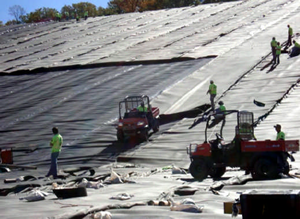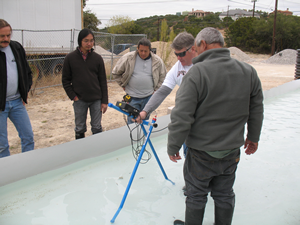 21 March 2012 – The T-CLIC (TRI/I-CORP Liner Integrity Center) spring geoelectric LISA (liner integrity survey and assessment) course will be held on 16-17 April at the TRI Environmental campus in Austin, Texas.
21 March 2012 – The T-CLIC (TRI/I-CORP Liner Integrity Center) spring geoelectric LISA (liner integrity survey and assessment) course will be held on 16-17 April at the TRI Environmental campus in Austin, Texas.
The two-day course consists of one day in the classroom and one day performing hands-on testing in three test cells; water-covered, soil-covered, and exposed liners, the last incorporating conductive geomembrane, conductive geotextile, and geosynthetic clay liners (GCLs). These two days provide a general educational background to geoelectric liner surveys, but are also the first phase of a surveyor certification program. Phase 2 of the certification program includes a field audit of a production survey and a 90 minute written test.
The two-day course has been presented in the spring and fall of each year since 2004. Approximately 300 people have attended the first two days, 50 people have undergone the field audit and written test, and 25 surveyors have been certified. Course attendees have been from the United Kingdom, Canada, Finland, Brazil, South Africa, Australia, Mexico, Peru, Portugal, Chile, Israel, as well as North America. The course has been taken on the road to New York, Houston, Edmonton, Halifax (Canada), The Philippines, the UK, and soon Chile.
 Installers take the course to apply as the final stage of CQC to confirm liner integrity before they hand their liner over to uncaring (sometimes) earth movers.
Installers take the course to apply as the final stage of CQC to confirm liner integrity before they hand their liner over to uncaring (sometimes) earth movers.
CQA Engineers take the course to apply as the final stage of CQA after all potential damage has been done to the liner and before handing over to the owner.
Design engineers require LISA to be done to confirm that they can design a minimally leaking liner. On this point learn about Maximum Allowable (Action) Leakage Rates and why “No leaks” is an impractical specification.
Regulators require that surveys be done on new landfill bottom liners and caps, on wastewater treatment plant (WWTP) lagoon liners, and periodically (every 4 or 5 years) on leachate ponds, power station ash-ponds, and fuel-oil tank secondary containment, etc. Surveys will eventually be required on power station coal-ash tailing pond liners and the hundreds of smaller liners associated with natural gas extraction wells.
General Contractors (should) take the course to understand the requirements of the liner installer, to preclude the unnecessary treatment/movement of adjacent soils and to ensure successful project performance.
Understand which lining systems can and cannot be surveyed, as all cannot be surveyed—e.g. a single liner with soil over the edge, a double liner with a geocomposite-only LDS.
See and use the latest upgrades in available equipment.
Course instructor is Dr. Ian D. Peggs (I-CORP INTERNATIONAL Inc.) a materials scientist/engineer who has been investigating liner failures since 1983 and performing surveys around the world since 1987.
For registration details please contact Chris Perez at cperez@tri-env.com.
Online registration and more course information is also located at:
https://www.geosyntheticstesting.com/reg/online_reg.php











